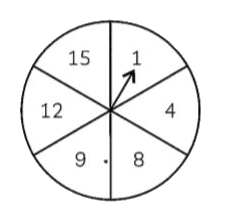An ordinary dice is rolled for a certain number of times. If the probability of getting an odd number 2 times is equal to the probability of getting an even number 3 times, then the probability of getting an odd number for odd number of times is :
132
516
316
12
The correct Answer is:D
To solve the problem, we need to find the probability of getting an odd number an odd number of times when rolling a die n times, given that the probability of getting an odd number 2 times is equal to the probability of getting an even number 3 times.
1. Identify the probabilities of odd and even numbers:
- A standard die has 3 odd numbers (1, 3, 5) and 3 even numbers (2, 4, 6).
- Therefore, the probability of rolling an odd number, P(O), is 36=12.
- Similarly, the probability of rolling an even number, P(E), is also 36=12.
2. Set up the equation based on the given condition:
- The probability of getting an odd number exactly 2 times when rolling the die n times is given by:
P(X=2)=(n2)(12)2(12)n−2=(n2)(12)n
- The probability of getting an even number exactly 3 times is given by:
P(Y=3)=(n3)(12)3(12)n−3=(n3)(12)n
3. Set the two probabilities equal:
(n2)(12)n=(n3)(12)n
- Since (12)n is common on both sides, we can cancel it out:
(n2)=(n3)
4. Use the property of combinations:
- The equality (n2)=(n3) implies:
n(n−1)=n(n−1)(n−2)/6
- This simplifies to:
6=n−2⇒n=5
5. Find the probability of getting odd numbers an odd number of times:
- We need to calculate the probability of getting odd numbers 1, 3, or 5 times when rolling the die 5 times:
P(odd times)=P(X=1)+P(X=3)+P(X=5)
- Calculate each term:
- For X=1:
P(X=1)=(51)(12)1(12)4=5⋅125=532
- For X=3:
P(X=3)=(53)(12)3(12)2=10⋅125=1032
- For X=5:
P(X=5)=(55)(12)5=1⋅132=132
6. Combine the probabilities:
P(odd times)=532+1032+132=1632=12
Final Answer:
The probability of getting an odd number an odd number of times is 12.
- A standard die has 3 odd numbers (1, 3, 5) and 3 even numbers (2, 4, 6).
- Therefore, the probability of rolling an odd number, P(O), is 36=12.
- Similarly, the probability of rolling an even number, P(E), is also 36=12.
- The probability of getting an odd number exactly 2 times when rolling the die n times is given by:
P(X=2)=(n2)(12)2(12)n−2=(n2)(12)n
- The probability of getting an even number exactly 3 times is given by:
P(Y=3)=(n3)(12)3(12)n−3=(n3)(12)n
(n2)(12)n=(n3)(12)n
- Since (12)n is common on both sides, we can cancel it out:
(n2)=(n3)
- The equality (n2)=(n3) implies:
n(n−1)=n(n−1)(n−2)/6
- This simplifies to:
6=n−2⇒n=5
- We need to calculate the probability of getting odd numbers 1, 3, or 5 times when rolling the die 5 times:
P(odd times)=P(X=1)+P(X=3)+P(X=5)
- Calculate each term:
- For X=1:
P(X=1)=(51)(12)1(12)4=5⋅125=532
- For X=3:
P(X=3)=(53)(12)3(12)2=10⋅125=1032
- For X=5:
P(X=5)=(55)(12)5=1⋅132=132
P(odd times)=532+1032+132=1632=12
The probability of getting an odd number an odd number of times is 12.
Topper's Solved these Questions
- JEE MAIN 2021BOOK - JEE MAINS PREVIOUS YEARCHAPTER - JEE MAIN 2021EXERCISE - SECTION-B
50 Videos
- JEE MAIN 2021BOOK - JEE MAINS PREVIOUS YEARCHAPTER - JEE MAIN 2021EXERCISE - (SECTION - A)
20 Videos
- JEE MAIN 2021BOOK - JEE MAINS PREVIOUS YEARCHAPTER - JEE MAIN 2021EXERCISE - Mathematic section B
10 Videos
- JEE MAINBOOK - JEE MAINS PREVIOUS YEARCHAPTER - JEE MAINEXERCISE - QUESTION
1 Videos
- JEE MAIN 2022BOOK - JEE MAINS PREVIOUS YEARCHAPTER - JEE MAIN 2022EXERCISE - Question
454 Videos
Similar Questions
A die is rolled n times. If the probability of getting odd number 2 times is equal to the probability of getting even number 3 times. Find the probability of getting odd number odd times
View SolutionA fair die is thrown n times. The probability of getting an odd number twice is equal to that getting an even number thrice. The probability of getting an odd number, odd number of times is
View Solution
Knowledge Check
An ordinary dice is rolled a certain number of times. If the probability of getting an odd number 2 times is equal to the probability of getting an even numebr 3 times. Then the probability of getting an odd number and odd number of times, is
A1/32B5/16C1/2Dnone of theseIf an unbiased dice is rolled, then the probability of getting an even number is _______ then/to that of getting an odd number.
AMoreBLessCEqualDCannot sayA fair coin is tossed 100 times. What is the probability of getting tails an odd number of times?
A14B23C12D34

What is the probability of getting an odd number on the spinner?
View SolutionA die is thrown once. find the probability of getting an odd number
View SolutionA die is thrown once. Find the probability of getting an odd number.
View SolutionA fair coin is tossed 100 times the probability of getting tails an odd number of time is
View SolutionA fair coin is tossed 100 times. What is the probability of getting tails an odd number of times?
View Solution
